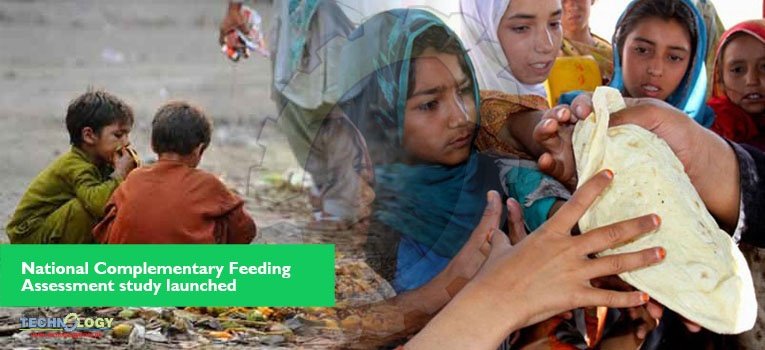National Complementary Feeding Assessment (NCFA) launched by the the Ministry of National Health Services, Regulation and Coordination (MoNHSR&C), Government of Pakistan, study of practices around feeding children, today in Islamabad.

The study was conducted with financial support of the United Kingdom’s Department for International Development (DFID) and the technical support of the United Nations Children’s Fund (UNICEF).
Inappropriate complementary feeding practices for children aged 6-23 months are a major cause of under nutrition and stunting. Lack of information has been a bottleneck in reversing the trend and improving the situation.
The NCFA provides an in-depth analysis on the feeding practices, related barriers and boosters as well as guidance to improve the said practices in the country.
The study is aimed at determining the factors contributing to the adverse complementary feeding practices and the nutritional status of children aged 6-23 months.
Only 15% children in the abovementioned age-group in Pakistan are receiving minimum acceptable diet for effective growth and development in Pakistan – a critically low figure.
The NCFA has achieved all four of its objectives:
(1) An in-depth analysis of variations in dietary diversity and minimum acceptable diet among children under two years of age.
(2) Qualitative Formative Research, which guides us in finding reasons of low levels of complementary feeding in the country as well as how to address this issue.
(3) Cost of Diet (COD) analysis that determines the availability, affordability as well as acceptability of nutritious diet
(4) OptiFood Analysis which identifies the problem nutrients and validates the NCFA recommendations.
Ms. Cristian Munduate, Deputy Representative for UNICEF in Pakistan, thanked DFID for their generous financial support and the MoNHSR&C for their leadership on the subject.
She further reiterated UNICEF’s commitment to support the MoNHSR&C and provincial departments of health in the development of the National Dietary Diversity Strategy and Plan to improve diets of young children in Pakistan.
“UNICEF will continue provincial as well as district level sensitisation and advocacy activities on the study findings, utilising available data for evidence-based nutrition programming to improve feeding practices,” said Ms. Munduate. She also emphasised context and content specific communication campaigns which she said will be conducted for wider awareness on the importance of dietary diversity.
Speaking at the event, Head of Basic Services Group Head, DFID, Ruth Lawson said, “Pakistan’s poorest and the most vulnerable children need our attention as the consequences of malnourishment in infancy and childhood will persist throughout their lives.”
She said she was pleased that DFID has supported research to understand the types of foods consumed by children and the compilation of the NCFA report. “I am confident that this data will lead towards better nutrition programming in Pakistan,” she added.
Dr. Baseer Khan Achakzai, Nutrition Director, MONHSR&C, also thanked DFID and UNICEF for their support in identifying the bottlenecks in the complementary feeding practices of young children. He said, “Addressing malnutrition is the top priority of the new federal government and all out efforts are being made in this respect, including major decisions in planning for different interventions.”
He further said that improvement of breastfeeding and complementary feeding practices to address malnutrition, especially stunting and wasting, are going to be the driving force of these interventions.
Mr. Achakzai also said that the Nutrition Wing of MoNHSR&C will continue to collaborate with development partners for the health and well-being of children of Pakistan.
Various representatives of the provincial governments, diplomatic community, the United Nations and DFID were also present on the occasion.